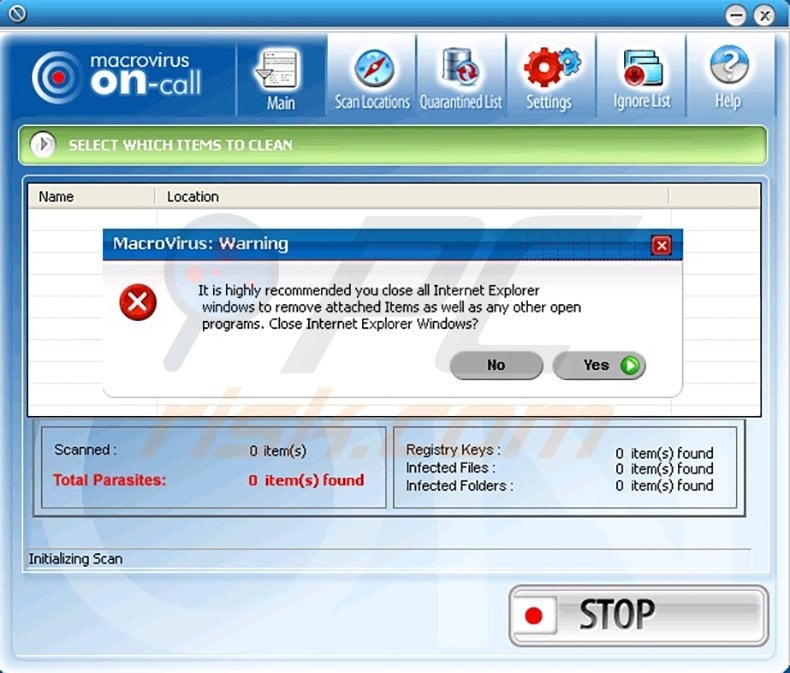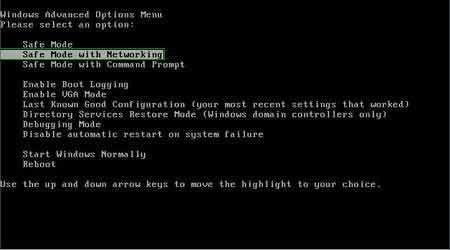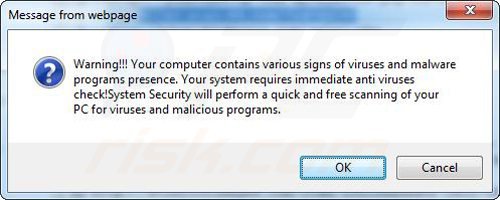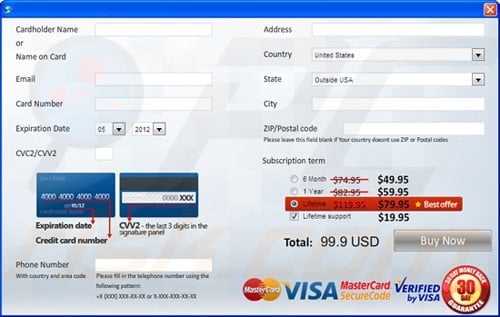Get free scan and check if your device is infected.
Remove it nowTo use full-featured product, you have to purchase a license for Combo Cleaner. Seven days free trial available. Combo Cleaner is owned and operated by RCS LT, the parent company of PCRisk.com.
What is Macrovirus On-Call?
Macrovirus On-Call is a fake computer scanner that attempts to scare you into believing that your PC is highly infected with various spyware. When installed, this rogue software scans your computer and reports many infections found on your PC.
You should not trust Macrovirus On-Call. This program merely imitates the functions of computer security scanning and displays fake results.
Do not try to remove the 'detected' files manually, as you could damage your operating system. Files 'detected' by Macrovirus On-Call are harmless and the identification of them is carried out to scare you into believing that your computer is at risk.

If you try to remove the 'infections' using Macrovirus On-Call, you will be encouraged to purchase a full license for this security scanner. You should not buy this program, it is a scam.
This program is useless and should be removed from your PC as soon as possible. Ignore the fake security scans and warning pop-ups displayed by this bogus program.
If you have already bought this program, you should contact your credit card company and dispute the charges, explaining that you have been tricked into purchasing a fake computer antivirus program. Use this removal guide to completely remove Macrovirus On-Call from your computer.
DOWNLOAD remover for malware infections
Combo Cleaner checks if your computer is infected with malware. To use full-featured product, you have to purchase a license for Combo Cleaner. 7 days free trial available. Combo Cleaner is owned and operated by RCS LT, the parent company of PCRisk.com.
Instant automatic malware removal:
Manual threat removal might be a lengthy and complicated process that requires advanced IT skills. Combo Cleaner is a professional automatic malware removal tool that is recommended to get rid of malware. Download it by clicking the button below:
DOWNLOAD Combo CleanerBy downloading any software listed on this website you agree to our Privacy Policy and Terms of Use. To use full-featured product, you have to purchase a license for Combo Cleaner. 7 days free trial available. Combo Cleaner is owned and operated by RCS LT, the parent company of PCRisk.com.
Quick menu:
- What is Macrovirus On-Call?
- STEP 1. Remove Macrovirus On-Call using Safe Mode with Networking.
- STEP 2. Remove Macrovirus On-Call manually by deleting files and registry entries.
Video showing how to remove adware and browser hijackers from a Mac computer:
Macrovirus On-Call removal
1. Start your computer in Safe Mode. Click Start, click Shut Down, click Restart, click OK.
During your computer starting process press the F8 key on your keyboard multiple times until you see the Windows Advanced Option menu, then select Safe Mode with Networking from the list.

Here is a video demonstrating how to start Windows in "Safe Mode with Networking":
Windows XP users:
Windows Vista / 7 users:
Windows 8 users:
2. Download HijackThis and save it to your desktop. Some malicious programs are able to block HijackThis, so when you click the download link, in the Save dialog, rename HijackThis.exe to iexplore.exe and only then click the Save button.
After saving the file to your desktop, double click it. In the main HijackThis window click the “Do a system scan only” button. Select the following entry (place a tick at the left of the entry):O4 - HKCU\..\Run: [MacroVirus] C:\Program Files\MacroVirus\MacroVirus.exe
After selecting the required entries, click "Fix Checked". After this procedure, you can close HijackThis and proceed to the next removal step.
3. Download legitimate anti-spyware software to fully remove Macrovirus On-Call from your computer.
DOWNLOAD remover for malware infections
Combo Cleaner checks if your computer is infected with malware. To use full-featured product, you have to purchase a license for Combo Cleaner. 7 days free trial available. Combo Cleaner is owned and operated by RCS LT, the parent company of PCRisk.com.
4. After downloading anti-spyware software, install it, update it, and then run a full system scan. Remove all infections found.
Additional information:
If you are unable to remove Macrovirus On-Call, you can use these manual removal instructions. Use them at your own risk, since if you do not have strong computer knowledge, you could harm your operating system.
Use them only if you are an experienced computer user. (Instructions on how to end processes, remove registry entries...)
End these Macrovirus On-Call processes:
macrovirus.exe
Remove these Macrovirus On-Call registry entries:
HKEY_CURRENT_USER\SOFTWARE\MacroVirus
HKEY_LOCAL_MACHINE\SOFTWARE\Microsoft\Windows\CurrentVersion\Uninstall\MacroVirus_is1
HKEY_CURRENT_USER\SOFTWARE\Microsoft\Windows\CurrentVersion\Run\MacroVirus
Delete these Macrovirus On-Call files:
C:\Program Files\MacroVirus\zlib.pyd
C:\Documents and Settings\All Users\Start Menu\Programs\MacroVirus\MacroVirus on the Web.lnk
C:\Documents and Settings\All Users\Start Menu\Programs\MacroVirus\MacroVirus.lnk
C:\Documents and Settings\All Users\Start Menu\Programs\MacroVirus\Uninstall MacroVirus.lnk
C:\Documents and Settings\[USER]\Application Data\MacroVirus\Settings\CustomScan.stg
C:\Documents and Settings\[USER]\Application Data\MacroVirus\Settings\IgnoreList.stg
C:\Documents and Settings\[USER]\Application Data\MacroVirus\Settings\ScanInfo.stg
C:\Documents and Settings\[USER]\Application Data\MacroVirus\Settings\ScanResults.stg
desktop+\MacroVirus.lnk
C:\Documents and Settings\[USER]\Application Data\Microsoft\Internet Explorer\Quick Launch\MacroVirus.lnk
C:\Documents and Settings\[USER]\Application Data\MacroVirus\Settings\Settings.stg
C:\Program Files\MacroVirus\_tst.pyd
C:\Program Files\MacroVirus\unicodedata.pyd
C:\Documents and Settings\[USER]\Application Data\MacroVirus\Settings\SelectedFolders.stg
C:\Program Files\MacroVirus\mav.db
C:\Program Files\MacroVirus\sqlite3.dll
C:\Program Files\MacroVirus\_sqlite.pyd
C:\Program Files\MacroVirus\bz2.pyd
C:\Program Files\MacroVirus\Launcher.exe
C:\Program Files\MacroVirus\MacroVirus.url
C:\Program Files\MacroVirus\mav.db.version
C:\Program Files\MacroVirus\mav.log
C:\Program Files\MacroVirus\mavapi.pyd
C:\Program Files\MacroVirus\msvcr71.dll
C:\Program Files\MacroVirus\python24.dll
C:\Program Files\MacroVirus\python24.zip
C:\Program Files\MacroVirus\MacroVirus.exe
Summary:
The fake antivirus programs (also known as "rogue antivirus programs" or "scareware") are applications that tries to lure computer users into paying for their non-existent full versions to remove the supposedly detected security infections (although the computer is actually clean). These bogus programs are created by cyber criminals who design them to look as legitimate antivirus software. Most commonly rogue antivirus programs infiltrate user's computer using poop-up windows or alerts which appear when users surf the Internet. These deceptive messages trick users into downloading a rogue antivirus program on their computers. Other known tactics used to spread scareware include exploit kits, infected email messages, online ad networks, drive-by downloads, or even direct calls to user's offering free support.
A computer that is infected with a fake antivirus program might also have other malware installed on it as rogue antivirus programs often are bundled with Trojans and exploit kits. Noteworthy that additional malware that infiltrates user's operating system remains on victim's computer regardless of whether a payment for a non-existent full version of a fake antivirus program is made. Here are some examples of fake security warning messages that are used in fake antivirus distribution:


Computer users who are dealing with a rogue security software shouldn't buy it's full version. By paying for a license key of a fake antivirus program users would send their money and banking information to cyber criminals. Users who have already entered their credit card number (or other sensitive information) when asked by such bogus software should inform their credit card company that they have been tricked into buying a rogue security software. Screenshot of a web page used to lure computer users into paying for a non-existent full version of macrovirus on-cal rogue and other rogue antivirus programs:

To protect your computer from macrovirus on-cal rogue and other rogue antivirus programs users should:
- Keep their operating system and all of the installed programs up-to-date.
- Use legitimate antivirus and anti-spyware programs.
- Use caution when clicking on links in social networking websites and email messages.
- Don't trust online pop-up messages which state that your computer is infected and offers you to download security software.
Symptoms indicating that your operating system is infected with a fake antivirus program:
- Intrusive security warning pop-up messages.
- Alerts asking to upgrade to a paid version of a program to remove the supposedly detected malware.
- Slow computer performance.
- Disabled Windows updates.
- Blocked Task Manager.
- Blocked Internet browsers or inability to visit legitimate antivirus vendor websites.
If you have additional information on macrovirus on-cal rogue or it's removal please share your knowledge in the comments section below.
Share:

Tomas Meskauskas
Expert security researcher, professional malware analyst
I am passionate about computer security and technology. I have an experience of over 10 years working in various companies related to computer technical issue solving and Internet security. I have been working as an author and editor for pcrisk.com since 2010. Follow me on Twitter and LinkedIn to stay informed about the latest online security threats.
PCrisk security portal is brought by a company RCS LT.
Joined forces of security researchers help educate computer users about the latest online security threats. More information about the company RCS LT.
Our malware removal guides are free. However, if you want to support us you can send us a donation.
DonatePCrisk security portal is brought by a company RCS LT.
Joined forces of security researchers help educate computer users about the latest online security threats. More information about the company RCS LT.
Our malware removal guides are free. However, if you want to support us you can send us a donation.
Donate
▼ Show Discussion